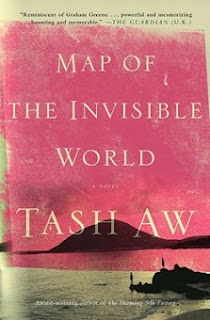"His classmates tore the pages from his books and folded them into paper airplanes that they launched into the air with sharp spearing motions. Adam watched as bits of the atlas glided past him: The pink and green of the United States floated dreamily in circles until it stubbed its nose on the blackboard and fell abruptly to the ground; the whiteness of the Canadian tundra swept out of the window in an arc, into the dusty sunlight; and the silent mass of the Pacific Ocean that Adam loved so much, dotted with islands (Fiji? Tahiti?) lay on the cracked cement floor, waiting to be trampled." -Tash Aw, Map of the Invisible World
It's not that Adam de Willigen was abandoned in an orphanage with his older brother Johan when they were children, or that Johan was adopted by a wealthy Malaysian couple who chose to leave the sickly Adam behind. It's not that Adam's adoptive father Karl, Dutch by birth, is hauled off by Indonesian authorities in the summer of 1964 at the height of the communist scare. It's not even that Adam must leave his house on the small island of Perdo for the political dangers of Jakarta when his father disappears. It's that after 16 years, Adam cannot recognize "home" and all it signifies as a concept that has ever belonged to him.
In Jakarta there is Margaret Bates, an American anthropologist whose photographs Adam finds among his missing father's possessions. Believing Margaret to have information on Karl's whereabouts, Adam climbs aboard a vessel leaving the port of Perdo and docks in Jakarta, the capital and largest city in the Indonesian archipelago. But the city he encounters is not the magnificent metropolis it once was; Jakarta is in political disarray, embittered by a territorial dispute with newly independent Malaysia and in the midst of purging a half-million citizens accused of being communists.
Jakarta's alleys are "filled with the aroma of incense and cooking and blocked drains" and President Sukarno is virtually helpless to prevent violent civil war from paralyzing his country. Buildings are crumbling. Rubble-strewn streets have become public urinals. American cigarettes are tools of bribery. Political unrest has settled itself like a dense and reeking fog over the capital and it is here, among the hatred and wreckage of once-great institutions, that Adam must find his father and slowly begin to reconcile his mind with the existence of home.
